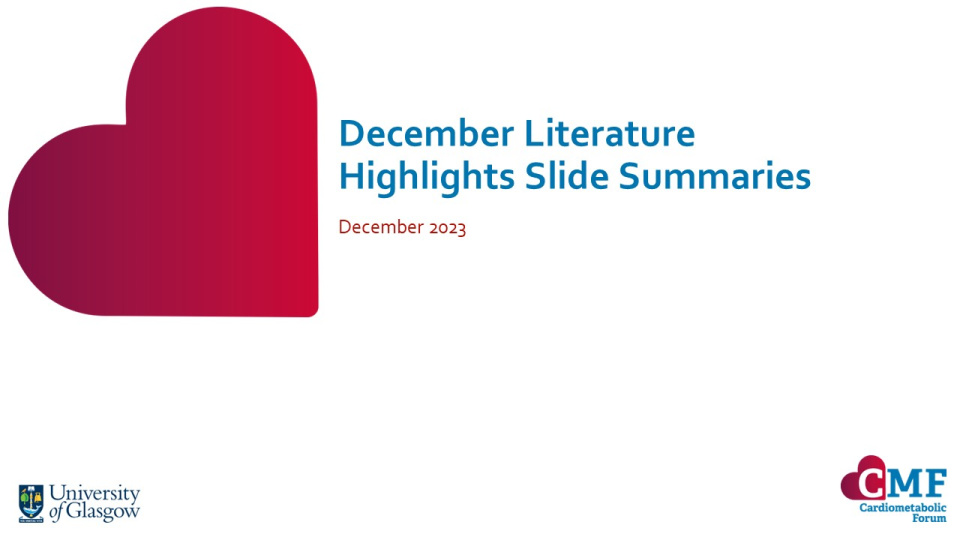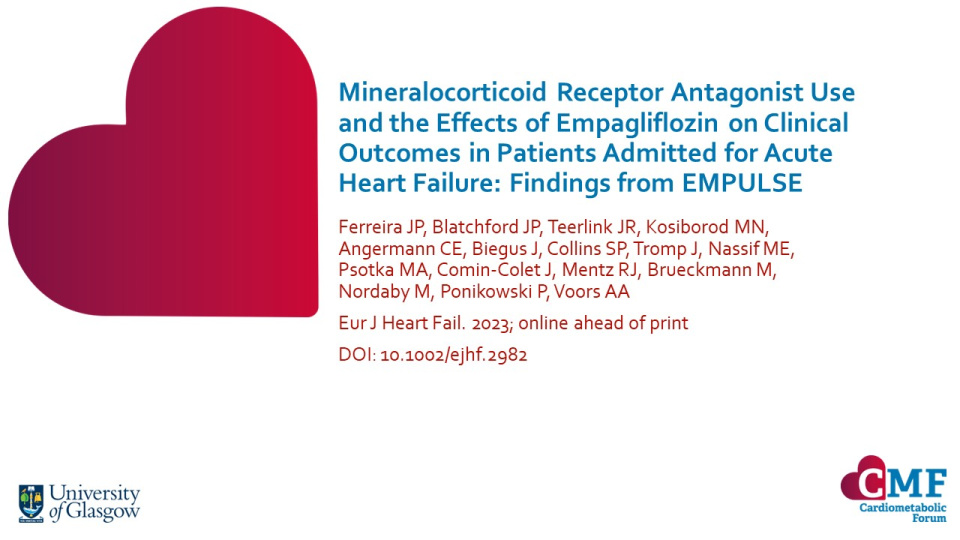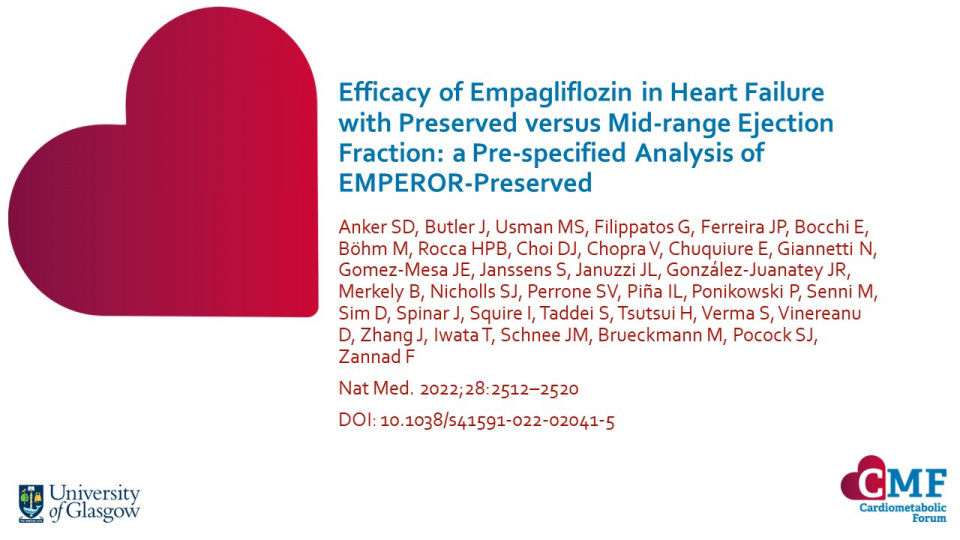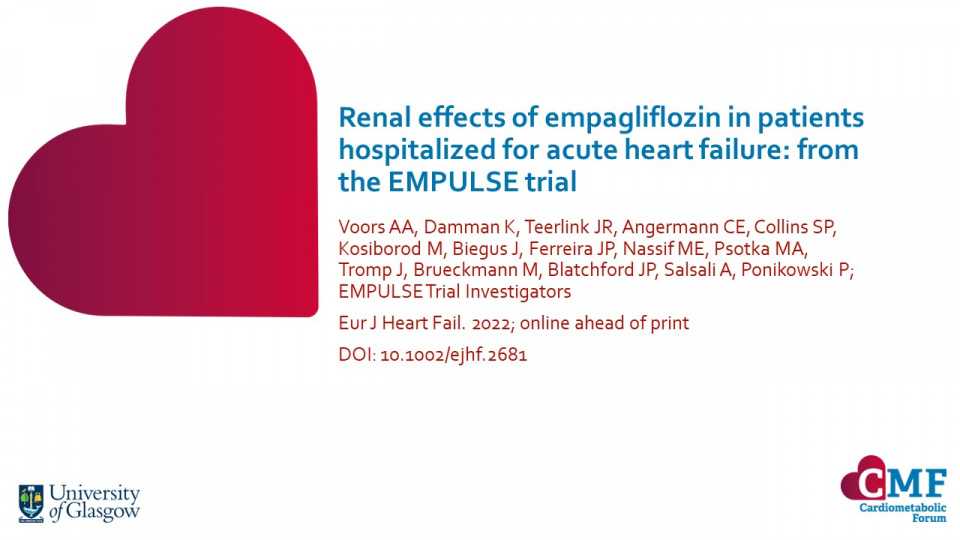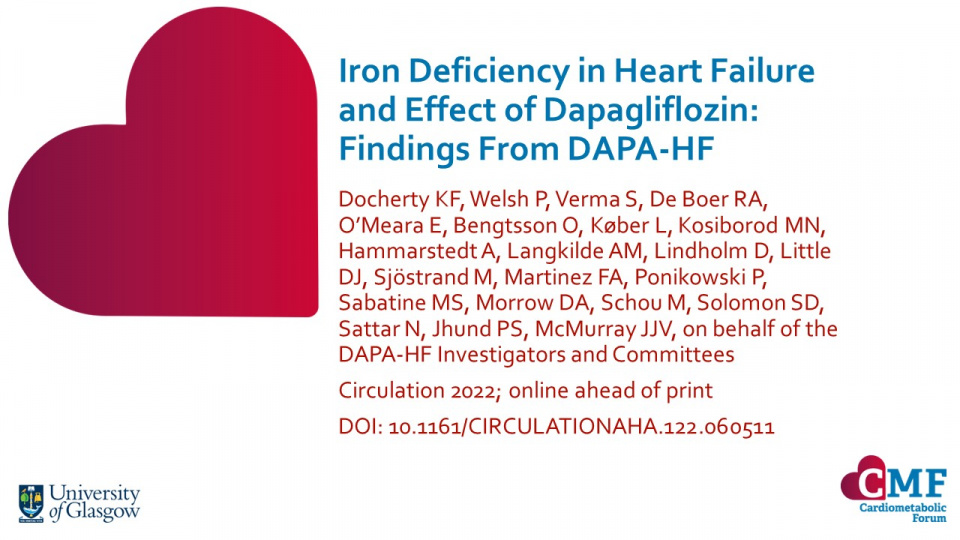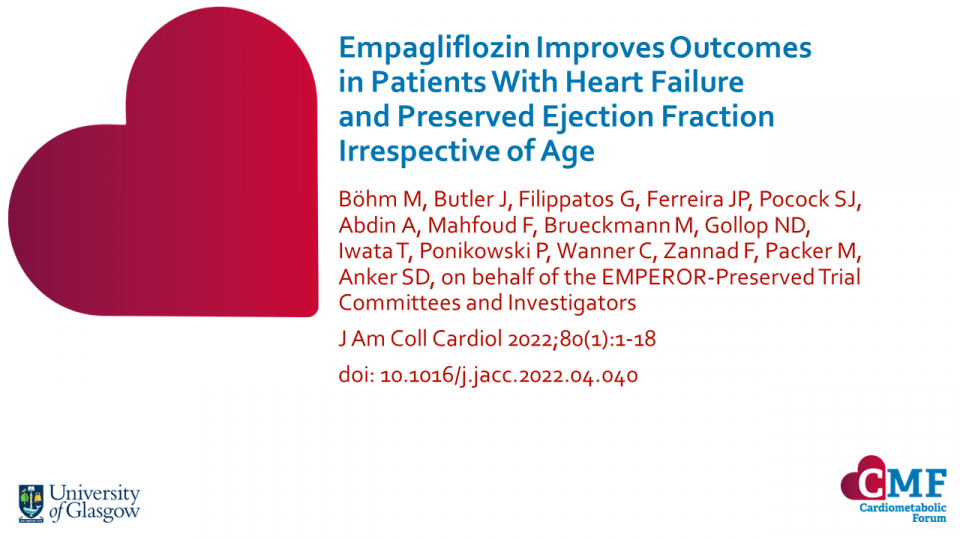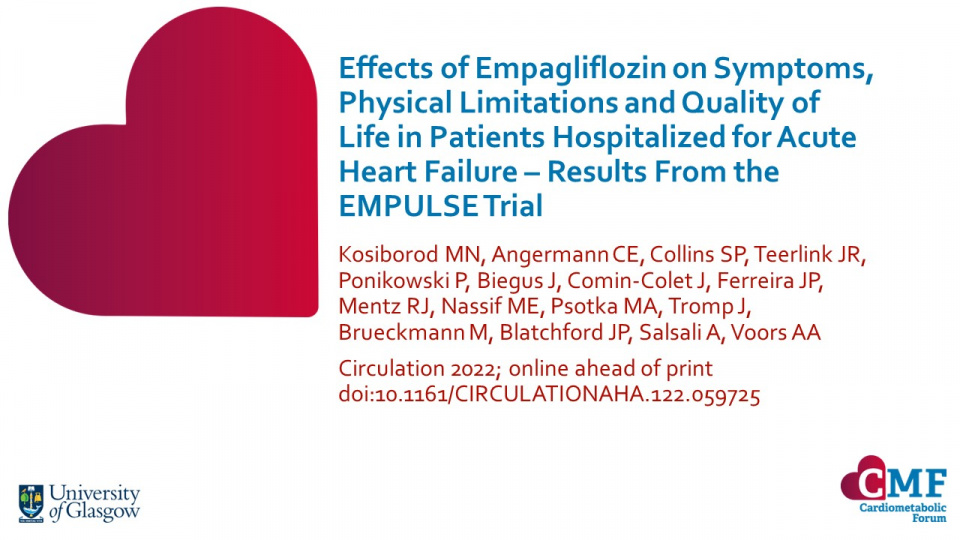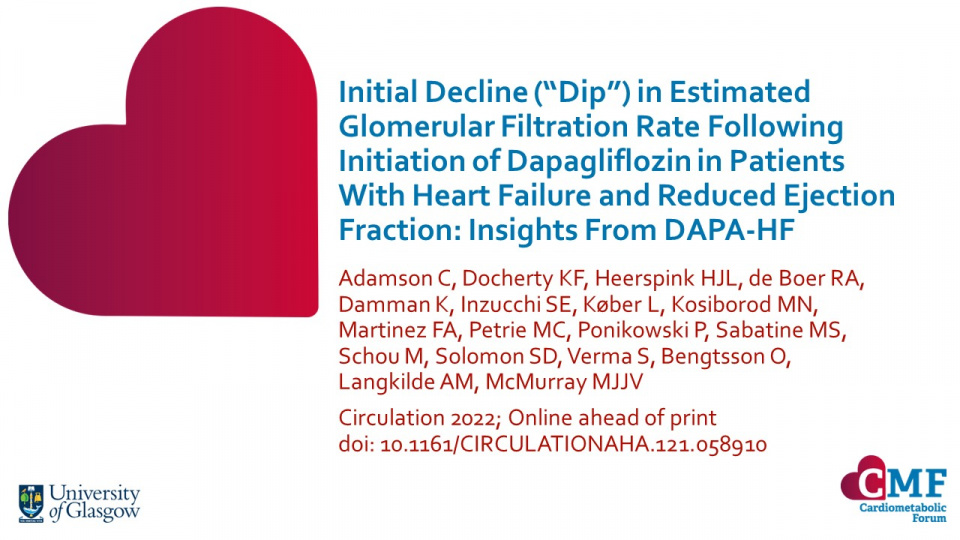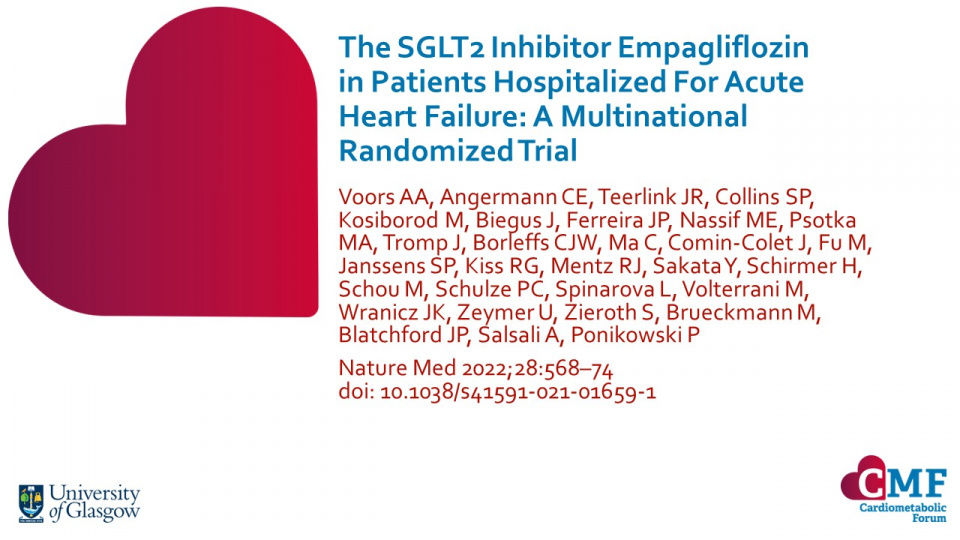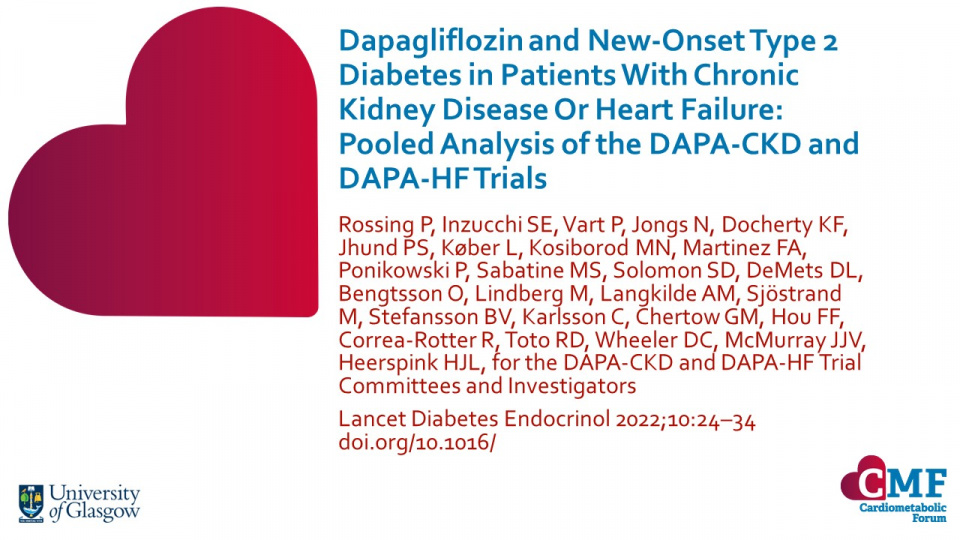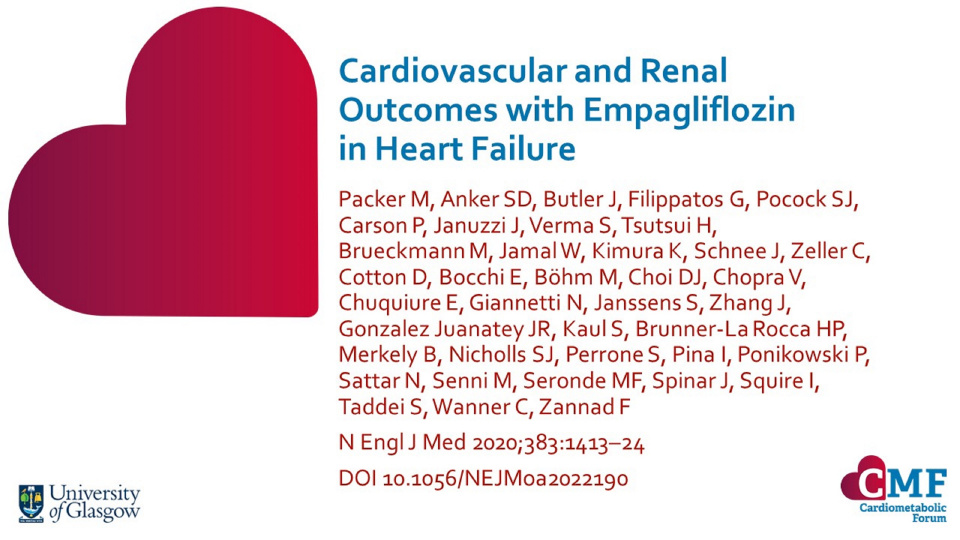Publications
Stay up to date with our literature reviews which are curated by experts to feature the most important publications released each month. Explore our publications for access to concise summary slides for your own use.
Mineralocorticoid Receptor Antagonist Use and the Effects of Empagliflozin on Clinical Outcomes in Patients Admitted for Acute Heart Failure: Findings from EMPULSE
Eur J Heart Fail. 2023; online ahead of print DOI: 10.1002/ejhf.2982
In the EMPULSE trial, empagliflozin produced greater clinical benefit than placebo in patients hospitalised for AHF. Although many patients with AHF are treated with MRAs, the interplay between empagliflozin and MRAs in AHF has not been explored. A post-hoc analysis of the EMPULSE trial aimed to evaluate the efficacy and safety of empagliflozin versus placebo according to MRA use at baseline.
Keywords:
Efficacy of Empagliflozin in Heart Failure with Preserved versus Mid-range Ejection Fraction: a Pre-specified Analysis of EMPEROR-Preserved
Nat Med. 2022;28:2512–2520 DOI: 10.1038/s41591-022-02041-5
Results from EMPEROR-Preserved demonstrated that empagliflozin improved CV death and HF hospitalisation – the primary outcome – in patients with HF and LVEF >40%. This pre-specified analysis of EMPEROR-Preserved aimed to evaluate the effect of empagliflozin in patients with HFpEF (LVEF ≥50%) compared with patients who had HFmrEF (LVEF 41–49%).
Keywords:
Renal effects of empagliflozin in patients hospitalized for acute heart failure: from the EMPULSE trial
Eur J Heart Fail. 2022; online ahead of print DOI: 10.1002/ejhf.2681
In a post-hoc analysis of EMPULSE in patients with acute heart failure (AHF), the clinical benefit of empagliflozin was consistent regardless of baseline renal function.
In the primary analysis of EMPULSE trial, initiation of empagliflozin in patients hospitalised for acute HF resulted in clinical benefit (a composite of all-cause death, number of HF events and time to first HF event and quality of life) at 90 days. However, the effects of empagliflozin and other sodium-glucose cotransporter-2 inhibitors (SGLT2i) on renal function during a hospital admission for acute HF remain largely unknown.
Iron Deficiency in Heart Failure and Effect of Dapagliflozin: Findings From DAPA-HF
Circulation 2022; online ahead of print DOI: 10.1161/CIRCULATIONAHA.122.060511
In this post hoc analysis of DAPA-HF, 43.7% of participants had iron deficiency at baseline, which was associated with worse outcomes. Dapagliflozin appeared to increase iron use but improved outcomes, irrespective of iron status at baseline.
Empagliflozin Improves Outcomes in Patients With Heart Failure and Preserved Ejection Fraction Irrespective of Age
J Am Coll Cardiol 2022;80(1):1-18 doi: 10.1016/j.jacc.2022.04.040
Sodium-glucose cotransporter-2 inhibitors (SGLT2i) reduce cardiovascular death and hospitalisation for heart failure (HHF) in patients with HFpEF, and are recommended in recent guidelines for heart failure with reduced ejection fraction (HFrEF), supported by Class IA evidence. Typically, HFpEF patients are older than HFrEF, and have a higher mortality risk associated with older age, while the risk for cardiovascular death is lower than in HFrEF. Until now, the treatment effects and safety of SGLT2i in relation to age have not been studied. This prespecified analysis of the EMPEROR-Preserved trial examined the interplay of age and empagliflozin treatment effects.
For patients on placebo, the incidence of primary outcomes and cardiovascular death increased with age. In contrast, empagliflozin reduced the primary outcome, first HHF, and first and recurrent HHF across all age groups. Empagliflozin also improved health-related quality of life, and attenuated the decline of eGFR without age interaction. Additionally, there were no clinically relevant differences in AEs between empagliflozin and placebo across the age groups, and elderly patients tolerated the treatment well.
Effects of Empagliflozin on Symptoms, Physical Limitations and Quality of Life in Patients Hospitalized for Acute Heart Failure – Results From the EMPULSE Trial
Circulation 2022; online ahead of print doi:10.1161/CIRCULATIONAHA.122.059725
This post hoc and prespecified analysis of the EMPULSE trial found that initiation of empagliflozin in patients hospitalised for acute heart failure (AHF) produced clinical benefit regardless of the degree of symptomatic impairment at baseline. Empagliflozin also improved symptoms, physical limitations, and quality of life – with benefits seen as early as 15 days and maintained through 90 days.
Initial Decline (“Dip”) in Estimated Glomerular Filtration Rate Following Initiation of Dapagliflozin in Patients With Heart Failure and Reduced Ejection Fraction: Insights From DAPA-HF
Circulation 2022; Online ahead of print doi: 10.1161/CIRCULATIONAHA.121.058910
The results of this subgroup analysis from DAPA-HF show that – although estimated glomerular filtration rate (eGFR) decline is generally associated with poorer prognosis in most situations – an initial dip with a sodium-glucose co-transporter-2 inhibitor (SGLT2i) may be associated with slower rate of decline in kidney function.
The SGLT2 Inhibitor Empagliflozin in Patients Hospitalized For Acute Heart Failure: A Multinational Randomized Trial
Nature Med 2022;28:568–74 doi: 10.1038/s41591-021-01659-1
Empagliflozin is well tolerated in patients hospitalised for acute heart failure, resulting in significant clinical benefit 90 days after treatment initiation.
Dapagliflozin and New-Onset Type 2 Diabetes in Patients With Chronic Kidney Disease Or Heart Failure: Pooled Analysis of the DAPA-CKD and DAPA-HF Trials
Lancet Diabetes Endocrinol 2022;10:24–34 doi.org/10.1016/
Chronic kidney disease and heart failure are insulin resistant states associated with high incidence rates of diabetes. Rossing et al. carried out a two Phase 3, randomised, double-blind, placebo-controlled trials assessed the effect of dapagliflozin on new-onset type 2 diabetes, in a pooled analysis of data from 6,608 individuals.
Cardiovascular and Renal Outcomes with Empagliflozin in Heart Failure
N Engl J Med 2020;383:1413–24 DOI 10.1056/NEJMoa2022190
Empagliflozin demonstrated a reduction in CV death, HF hospitalisation, rate of eGFR decline and risk of serious renal outcomes in patients with chronic HF and reduced ejection fraction in the EMPEROR-reduced study.

